UW Aquatic & Fishery Sciences Quantitative Seminar
Ray Webster
International Pacific Halibut Commission
Covariate-dependent tag-recovery models for fisheries data with missing covariate values
Abstract
In fishery applications of tag-recovery models, recovery probabilities are typically parameterised in terms of instantaneous rates of mortality, where the mortality rate can be a function of the size or age of a fish. For age-dependent tag-recovery models, past work on Pacific halibut used a fixed-age approach, in which the age of each fish was fixed at the same value for each halibut of a given length using a length-age key. In this work, we examined age-dependent tag-recovery models that allow for variability in ages. The age of tagged halibut can only be determined for recovered tagged animals, and when modelling data from the International Pacific Halibut Commission’s passive-integrated transponder (PIT) tagging study on Pacific halibut, we used auxiliary information from the annual setline surveys to model the age of un-aged fish. Both Bayesian and multiple imputation methods were examined. The former appeared to suffer from problems with parameter identifiability, and ultimately, only the latter was applied to the PIT tag data. The results showed large differences in both mortality and migration rate estimates between models that allowed for variability in age and those that fixed age at a constant value for a given length.

